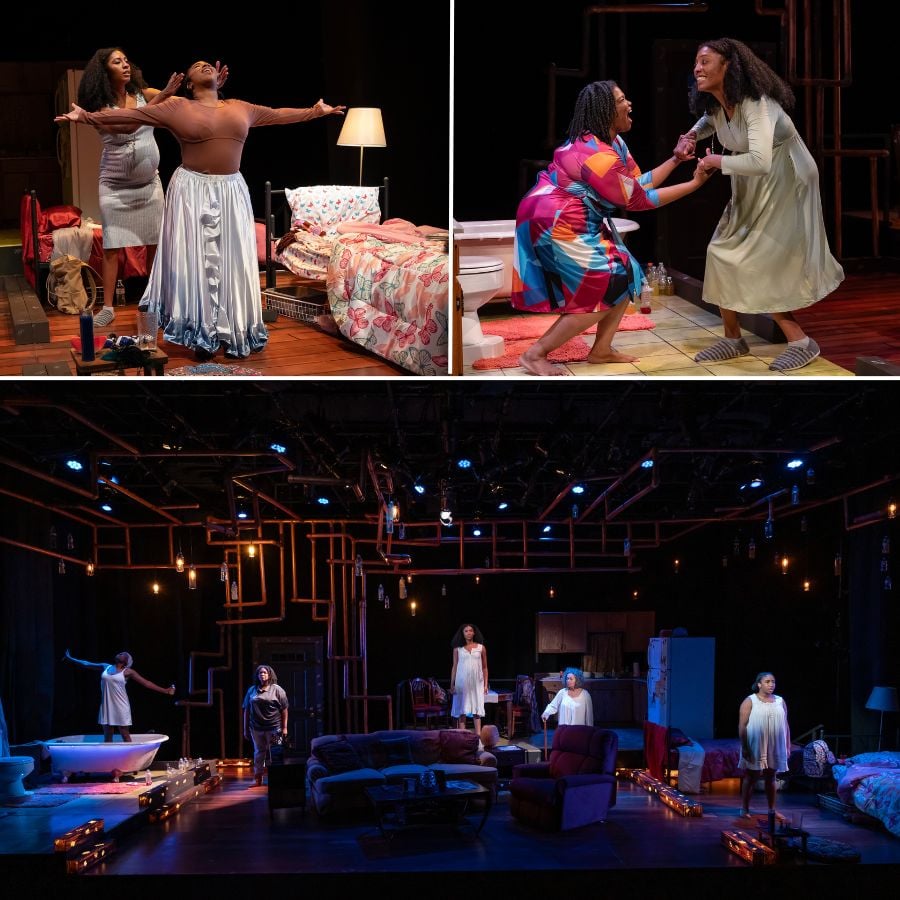It has been so long since there’s been any news about the water crisis in Flint, Michigan, that I thought the crisis was over. Didn’t you?
cullud wattah, written by Erika Dickerson-Despenza and directed by Danielle A. Drakes, informs us not only that the crisis in Flint is not over but that wherever we are in the country, we are also victims of this crisis and complicit in its implementation. What Dickerson-Despenza and Drakes have produced in collaboration with their fiercely committed cast is not a news report, social realism, or propaganda. Just as Euripides did with The Trojan Women, cullud wattah offers us a moving chronicle of a people under siege: a testimony of witness that is both epic in scale and personal in its appeal.

The siege of Troy lasted for 10 years. It has been 3,650-plus days since the people in Flint have had clean water. That’s 10 years. The play explores a question that we rarely ask and to which we never really want to know the answer: What is daily life like for the people we target for extinction and by whose extinction we profit? cullud wattah is one of the most urgent and satisfying pieces of theater on DC stages now.
The play — which won the 2021 Susan Smith Blackburn Prize — takes us into the lives of three generations of Black women living under one roof in Flint, Michigan, in 2016. This is an ensemble piece, and all of the performers are strong and supportive of others onstage. The focus is on shared pain and support of the group.
At this time, the water crisis in Flint had been in place for 936 days. Plum (Ezinélia Baba) is the school girl, learning mathematics and having her homework checked by her aunt. The polluted water coming from the city pipes has caused her to develop leukemia and to lose her hair. Marion (Kelly Renee Armstrong) is Plum’s mother and the primary income source for the house. Reesee (Khalia Muhammad) is an older sister who is a lesbian and budding worshiper of Yemanja, a major water deity (orisha) from the Yoruba religion. Big Ma (Lizan Mitchell) is the matriarch, the source of generational and ancestral memory for this family. Ainee (Andreá Belamore) is a recovering drug user who is celebrating being clean for one year. She is also pregnant with a child she names Tomorrow.

Scenic designer Nadir Bey has constructed a space that welcomes the audience in and makes them feel comfortable. As we begin to see it in use, it starts to feel like a cross between a humble and nurturing nest and a bomb shelter. When the women enter the space they seem to float up in formation from a floor below. The narrow street access is upstage center in the set. And though it does not have a lot of locks on it, it does not feel inviting. This island of security and safety is surrounded by the lights (Hailey LaRoe) that periodically flare up in conjunction with low-level sonic booms (Navi).
We see how the poisoned and polluted water causes burns on the women’s skin. How they count up and budget for the number of bottles of water needed to wash their bodies, prepare food, wash dishes, wash the floor. At the beginning of the show, under the pressure of her family measuring out their lives in terms of how much water they can afford while still being charged for the unusable water coming from the tap, we see that the youngest of this group has begun to walk in her sleep and to dream of drowning. By this lyrical and loving chronicling of their daily tasks of survival, cullud wattah successfully immerses us in the horror of these women’s lives so that you can’t help but ask yourself: is this also what genocide looks like?
The story is suffused with efforts on the part of this group of women to tap into and magnify sources of hope. These efforts are grounded in remembered, resurrected, and re-imagined ritual. The show begins appropriately enough with the song “Wade in the Water”: an invitation to confront the cataclysmic disaster and find whatever lesson or key is in it to transform it into a tool for survival. But here the lyrics are changed. Instead of “Wade in the water” the women sing, “Lead in the water.” Instead of “God’s going to trouble the water,” the women sing, “Snyder playing god with water.” With these word changes, the song shifts from the existential to the topical, contemporary protest and political comment. But the ominous rhythmic and harmonic structure of the spiritual remain, compelling us to hear the adapted version as more than just a protest song, however pointed.
The production is full of desperate and determined practice of ritual. In addition to spirits known and unknown, an important part of their collective rituals of survival is the way that the women constantly remind each other that their lives are real. The efficacy and failure of God or the gods is a major concern of the play. Where are our gods? Who are they? What can they do for us? are some underlying questions the action brings. At one point, one of the characters says: “I ain’t got no god. None of it worked. Jesus. Yemaja. Ain’t none of it worked.”
Nevertheless, rather than succumbing to despair, this strong ensemble leaves us with outrage and encouragement.
Running time: Approximately two hours with one 10-minute intermission.
cullud wattah plays through April 27, 2025, presented by Mosaic Theater Company performing in the Sprenger Theatre at Atlas Performing Arts Center, 1333 H Street NE, Washington, DC 20002. Performances are Thursdays at 11 am (April 24); Thursdays–Saturdays at 7:30 pm; Saturdays at 3 pm; and Sundays at 3 pm. Tickets are $53–$70 and available by contacting the box office at (202) 399-7993 or boxoffice@atlasarts.org from 12 pm–6 pm Tuesday through Sunday, or one hour prior to a performance. Tickets may also be purchased online.
The digital program is downloadable here.
Senior discount of 10% when using the discount code SENIOR. Student tickets $20 with discount code STUDENT. Educator: $20 with discount code EDUCATOR. Limited number of rush tickets are available via walk-up one hour before the start of each performance. Military and First Responder rate: 10% with discount code HERO. Under 30: $25 with code UNDER30 (not available on weekend matinees).
Open-Captioned Performances: Saturday, April 19, 7:30 pm; Sunday, April 20, 3 pm.
COVID Safety: Saturday, April 12, 7:30 pm is a mask-required performance.
cullud wattah
Written by Erika Dickerson-Despenza
Directed by Danielle A. Drakes
CAST
Plum: Ezinélia Baba
Marion: Kelly Renee Armstrong
Reese: Khalia Muhammad
Big Ma: Lizan Mitchell
Ainee : Andreá Belamore
Scenic Designer: Nadir Bey
Lighting Designer: Hailey LaRoe
Costume Designer: Brandee Mathies
Wig Designer: Larry Peterson
Sound Designer: Navi
Props Designer: Luke Hartwood
Stage manager: Shayna O’Neill
Intimacy and Violence Director: Sierra Young
Movement Director Culture Consultant: Dane Figueroa Edidi



